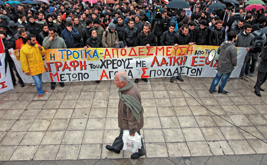Chilling Dissent on Wall Street Chilling Dissent on Wall Street
Corporate whistleblowers get the silent treatment from Washington.
Mar 6, 2012 / Eyal Press

Workers, and NLRB, Under Attack Workers, and NLRB, Under Attack
Republicans have accomplished what Democrats and unions never could: they’ve made the National Labor Relations Board a household name.
Mar 5, 2012 / Josh Eidelson
This Week: The Folly of Austerity. PLUS: A New Nation Blog! This Week: The Folly of Austerity. PLUS: A New Nation Blog!
This week, London correspondent Maria Margaronis reports from Athens on the austerity crisis. Plus, a new Nation crossword blog, and the Izzy Awards are announced.
Mar 3, 2012 / Katrina vanden Heuvel
2012: Year of the Co-Op! VIDEO 2012: Year of the Co-Op! VIDEO
Around the world, a billion people belong to co-ops. The top 300 have combined sales in excess of $1 trillion. That’s according to the United Nations. That’s right, it'...
Mar 2, 2012 / Laura Flanders

This Week in Poverty: Hunger—Where We Are, Where We Need to Be This Week in Poverty: Hunger—Where We Are, Where We Need to Be
The food stamp program is up for reauthorization and three new studies indicate what needs to be done if we want to protect and strengthen it.
Mar 2, 2012 / Greg Kaufmann

Maria Margaronis: Something New Is Happening in Greece Maria Margaronis: Something New Is Happening in Greece
How are ordinary Greeks dealing with a country spiraling out of control?
Mar 1, 2012 / The Nation
Republic Windows Workers Consider Employee-Owned Co-Op Republic Windows Workers Consider Employee-Owned Co-Op
In 2008, a worker occupation at the Chicago factory sent up a flare of resistance. Now those same workers are considering alternatives to working for a boss.
Mar 1, 2012 / Laura Flanders

The Failure of Austerity The Failure of Austerity
The eurocrisis fully exposes the folly of deficit mania in a time of recession. So why are the GOP candidates still oblivious?
Feb 29, 2012 / The Editors

Greece in Meltdown Greece in Meltdown
In less than two years, Athens has changed from a reasonably prosperous capital to a broken city.
Feb 29, 2012 / Feature / Maria Margaronis
UK Labor Leader Threatens Strikes During the London Olympics UK Labor Leader Threatens Strikes During the London Olympics
We might have ourselves a good-old fashioned strike scenario during the London Olympic games.
Feb 29, 2012 / Dave Zirin
